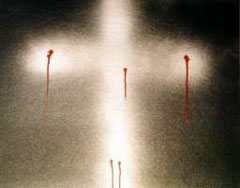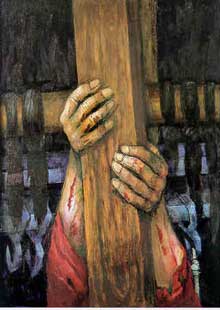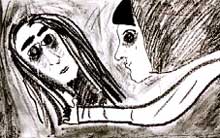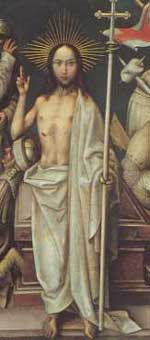|










|
|
 |
- To suffer
- of many things.
|
"From that time (when Peter explicitly acknowledged
that he was sent by God) Jesus was beginning to show to his disciples
that he must go to Jerusalem and suffer many
things of the elders, and chief priests and scribes, to
be killed and be raised again the third day" Mathew
16, 21).
Mathew, Mark (8, 31) and Luke (9, 22) reported this key
sentence in their Gospel. More than a simple announcement of
the close Pascal event, it represents a fundamental aspect of
the life of Christ and his followers because "a disciple
is not above his master"
"Suffer of many things" does it mean we must necessarily
suffer? A certain Christian culture did not escape from this
"dolorism" and had insisted on suffering as a mean
to be saved.
In this part of the Gospel, Mathew speaks about the suffering
of Jesus at a specific time and place, Jerusalem, the religious
center of his country. It will be a relatively short moment of
confrontation with the elders, the chief priests and the scribes
who represent the main powers.
 |
The power of the elders is in the family and in the organization
of the society; also in the request of an unconditional agreement
to centuries old wisdom written in laws and customs, this power
is also based on a wealth accumulated through the years. In religion,
the power of the chief priests is linked to the sacred concepts
of existence and relationships to God; this power includes the
privilege to exclude people. |
The power of the scribes resides in their knowledge and
in their possibility to define what is true in the Holy Scriptures.
Jesus is "powerless"; he is not an elder, neither a
member of the sacerdotal family nor a scholar devoted to the
Scriptures. For the world of money, tradition, holiness and politics,
his life of a Galilean prophet does not count much. The Gospel
does not speak about how he had to struggle against his opponents
and get rid of them but it says only "he had to suffer from
them" How to suffer of many things? He did like a non-violent,
in a silence full of dignity and with the conscience at rest
like a free man.
Acting as non-violent, during his trial, he just pronounced
a few essential words on his identity and his message. That did
not prevent him to adequately recall their responsibility when
they were offending him: the soldier who was slapping him, Pilate
who was playing with his undisputed power.
All through the course of his passion one can notice how
his conscience is peaceful; he is a free man. He is not there
to obey any order coming from above but simply to faithfully
practice "the beatitudes" The people who did not want
a new order made of fraternity and equality cannot tolerate that.
|
The suffering of the elders, the chief priests and the scribes
also will undoubtedly happen to the disciples of Jesus in all
the times. |

|
There is not any more undisputable authority, neither fascinating
sacred world, nor infallible knowledge for his disciples, it
is so different from their unmovable attitude!
Testifying for the love of God, animated by God, the Christians
are not ideologists in charge of promoting a religious system
and of defending it with a sword like their opponent one as during
the time of the crusades. Not using the weapons of this world,
they respond to their offenders only by calm and committed statements
or by their silence.
"Suffer of many things" like Jesus is a spiritual
and intense spiritual experience, which places the Christians
in a difficult position surrounded by pitfalls. They need perceptiveness
and humility, gentleness and firmness; it is the opposite of
a bitter or obtuse resistance, they do not despise their opponents.
Like Jesus we have to be able to say " Father, forgive them,
for they know not what they do"
 |
The experience of non-violence requires a sound knowledge
of the obedience due to those having the power and a supreme
freedom of conscience, whoever is, elder, hierarch or scribe,
willing to impose his power on us. Peter and John said it clearly
facing the Sanhedrin: " To obey God rather than man!"
(Acts 4, 19). This can lead to the exclusion of the Crucified,
symbolically dieing outside the wall of the Holy City. Dark night
when only the faith in the resurrection is the only possible
outcome. |
|
